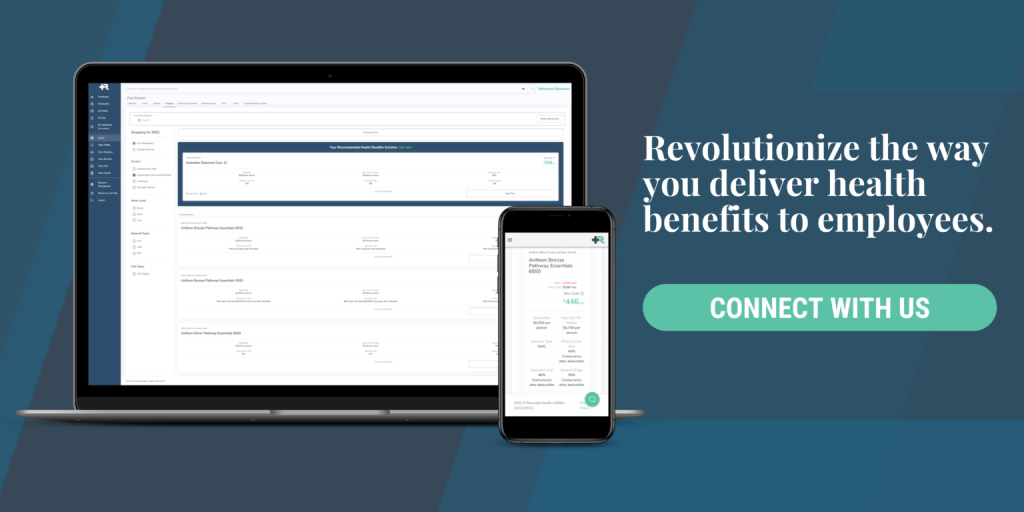ICHRA Reimbursement: 3 Strategies You Should Know
By Mallory Meyer on Dec 4, 2024 7:27:00 AM

Finding the right way to provide health insurance can feel overwhelming, especially when trying to balance employee satisfaction with budget control. ICHRA reimbursement strategies offer a modern approach to health benefits, giving employers the tools to streamline costs while enhancing flexibility and choice for their teams.
How can these strategies help you manage benefits with ease?
With ICHRA, employees enjoy health insurance portability, enabling them to choose plans that fit their needs and maintain coverage even during life changes. For employers, this means reducing administrative burden and ensuring compliance with IRS guidelines, all while fostering a more satisfied workforce.
In this blog, we’ll dive into three impactful ICHRA reimbursement strategies that can transform how you manage health benefits. Let’s explore how ICHRA can simplify your health insurance solutions!
ICHRA Basics: Foundation of Health Reimbursement
Individual Coverage Health Reimbursement Arrangements (ICHRAs) stand out among other HRAs, such as the Qualified Small Employer Health Reimbursement Arrangement (QSEHRA) and the Group Coverage Health Reimbursement Arrangement (GCHRA).
Unlike QSEHRA, which is designed for small businesses with fewer than 50 employees, and GCHRA, which works alongside a traditional group health plan, ICHRA gives businesses of all sizes the flexibility to reimburse employees for individual health insurance and eligible medical expenses.
Eligibility is straightforward. Employers can offer ICHRAs regardless of size, and employees qualify if they have individual health coverage that meets minimum essential standards. This flexibility makes ICHRA an excellent choice for both small businesses and large organizations seeking alternatives to group health plans.
The IRS sets clear regulations for ICHRAs. Contributions are tax-free for employers, and reimbursements are tax-exempt for employees, as long as they go toward eligible expenses. However, employers must follow strict reporting guidelines to maintain compliance.
By meeting these IRS requirements, businesses can reimburse employees confidently while optimizing tax advantages. It’s a win-win: simplified health coverage and financial peace of mind for everyone involved.
Benefits of ICHRA for Employers and Employees
ICHRAs bring a fresh perspective to health benefits by offering flexibility and personalization for both employers and employees.
Benefits of ICHRA for Employers and Employees
- Predictable Health Benefits Costs: With ICHRAs, employers can set fixed reimbursement limits, making health benefits expenses more predictable. This reduces the risk of unexpected spikes in healthcare costs, which are common with traditional group plans.
- Flexible Benefit Design: ICHRAs let employers design benefit packages to suit diverse workforce needs. You can tailor contributions by employee class, whether full-time, part-time, or seasonal, aligning with business goals and employee expectations.
- Compliance with ACA Standards: ICHRAs meet Affordable Care Act (ACA) requirements, helping employers avoid penalties while still offering meaningful health benefits. It’s a win-win for compliance and care.
Advantages for Employees
- Freedom to Choose Plans: Employees get the freedom to select health insurance plans that suit their personal needs. Whether it’s for a single individual or a family, the choice is in their hands.
- Portable Benefits: Health benefits go with employees even if they change jobs or move locations. This portability ensures coverage stays consistent and reliable.
- Tax-Free Reimbursements: Reimbursements for health insurance premiums and qualified medical expenses are tax-free, saving employees money while providing essential healthcare coverage.
ICHRAs truly offer something for everyone, making health benefits more practical, personalized, and empowering.
Strategy 1: Premium Reimbursement Strategy
Premium reimbursement is a core element of ICHRA reimbursement strategies, allowing employers to reimburse employees for individual health insurance premiums. This approach empowers employees to select plans tailored to their needs while maintaining cost control for employers. It’s a flexible and practical alternative to traditional group health insurance.

Steps to Implement a Premium Reimbursement
- Set Reimbursement Limits: Determine how much you’ll reimburse employees each month. Ensure limits align with your budget and business goals.
- Communicate Clearly: Inform employees about reimbursement policies, including eligible individual health insurance coverage and submission processes.
- Verify Eligible Plans: Ensure employees select plans that meet minimum essential coverage standards under IRS guidelines.
- Track Reimbursements: Use software tools to monitor submitted claims and ensure accurate payments.
Best Practices for Premium Reimbursement
- Promote Transparency: Share clear details about reimbursement limits and eligible expenses.
- Encourage Employee Feedback: Ask employees for input to refine the program and boost satisfaction.
- Provide Resources: Offer support for navigating the health insurance marketplace.
Compliance Considerations
Following IRS guidelines is essential for premium reimbursement. Maintain detailed documentation of reimbursements and ensure plans meet ACA standards. This includes requiring proof of individual health insurance premiums and issuing annual summaries.
Strategy 2: Out-of-Pocket Expense Reimbursement Strategy
Out-of-pocket reimbursement covers qualified medical expenses beyond premiums, such as prescriptions, copays, and deductibles. This strategy complements preventive health services by reducing the financial burden on employees.
Documentation and Compliance
Keep records of all reimbursed expenses, including receipts and descriptions. The IRS requires precise documentation for both employers and employees. Regularly review submissions to ensure compliance with guidelines.
Read More | Choosing Between ICHRAs and Self-Funded Plans
Strategy 3: Hybrid Reimbursement Strategy (Premium + Out-of-Pocket)
The hybrid reimbursement strategy blends premium and out-of-pocket expense reimbursements, offering maximum flexibility. This allows employers to meet diverse needs within employee classes while maintaining budget control.
When designing a hybrid ICHRA, align contributions with your organization’s goals. Structure limits by balancing premium and expense reimbursements to suit salaried employees or other classifications.
Pros and Cons of Hybrid Strategy
- Employee Benefits: Employees enjoy flexibility in allocating reimbursements, enhancing satisfaction.
- Employer Considerations: Balancing budget control with employee choice can be challenging but worthwhile.
Compliance Essentials for Hybrid Strategy
Ensure adherence to IRS rules by maintaining detailed documentation of all reimbursements. Records should include receipts for individual health insurance premiums and invoices for out-of-pocket expenses, along with proof of payment. This helps verify that all reimbursements align with qualified medical expenses and comply with IRS requirements.
Regularly review plan designs to meet evolving compliance standards. Updates to IRS regulations or ACA guidelines may necessitate adjustments to reimbursement limits or eligibility criteria for employee classes. Staying proactive ensures your hybrid ICHRA plan remains compliant and continues to meet employee needs effectively.
Learn more about how Remodel Health’s ICHRA+® can benefit your organization
How to Choose the Right ICHRA Strategy for Your Business
Selecting the right ICHRA strategy involves assessing your organization’s unique needs and priorities. Factors like the size and diversity of your workforce, industry-specific healthcare requirements, and budget constraints all play a role. For example, small employers might prioritize cost efficiency, while larger organizations may focus on diverse employee needs.
Additionally, understanding whether your employees prefer an individual health insurance plan or require broader flexibility can guide your choice. The right strategy balances your budget with the goal of offering meaningful and competitive benefits.
Budgeting for ICHRA
Forecasting reimbursement costs is key to a sustainable ICHRA strategy. Start by analyzing current healthcare expenditures and projecting future needs. Balance cost efficiency with competitive benefits to ensure your offerings attract and retain talent without exceeding financial limits.

Assessing Employee Needs and Preferences
Employee feedback is a goldmine for making informed decisions. Conduct surveys or feedback sessions to learn what health benefits matter most to your team.
Utilize demographic data, like age groups or geographic locations, to tailor your strategy. This ensures the chosen plan aligns with employee needs, improving satisfaction and participation.
Compliance and Legal Consultation
ICHRA experts and advisors are essential allies in building a compliant ICHRA. They help you avoid pitfalls like exceeding reimbursement limits, misclassifying employees, or improperly handling premium tax credits.
Consultation ensures your ICHRA adheres to regulations while maximizing its benefits for employees and employers alike.
Read More | How to Tackle ICHRA Complexities with Ease
Maximizing Benefits with ICHRA Reimbursement Strategies
Choosing the right ICHRA reimbursement strategies can transform how you manage employee health benefits. By leveraging the flexibility of an Individual Coverage HRA, you can balance cost efficiency with tailored support for your workforce. Whether it’s premium reimbursement, out-of-pocket expense coverage, or a hybrid approach, ICHRAs empower both employers and employees.
These strategies simplify budgeting and improve employee satisfaction by addressing their diverse health needs. Offering reimbursements for qualifying medical expenses gives employees peace of mind and financial relief while ensuring compliance with IRS guidelines.
Ready to explore how ICHRAs can benefit your organization?
Remodel Health provides expert guidance in designing and managing tailored ICHRA solutions. Let us help you streamline your health benefits while maximizing value for your team.
Contact us today to get started!
Check out more resources
See these related articles

Mastering ICHRA Contribution Basics
In recent years, the Individual Coverage Health Reimbursement Arrangement (ICHRA) has emerged as a powerful tool for employers to provide flexible, personalized healthcare options to their employees. With formal rules established, employers are now able to contribute to their employees’ purchase of ACA Individual/Family plans or Medicare costs, a move that ushers in a new […]

How To Maximize Your Tax Savings With ICHRAs
Remodel Health is dedicated to helping employers and their employees maximize their tax savings with ICHRAs.

ICHRA Reimbursement for Employers and Employees: A Step-by-Step Guide
Let's walk through the ICHRA reimbursement steps to help ensure a smooth and efficient experience for both employers and employees.

